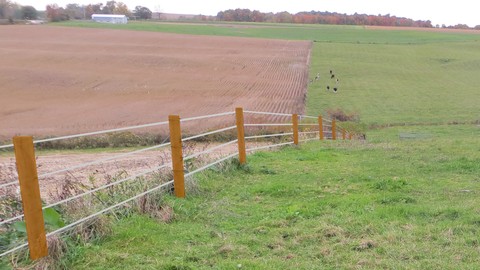
Agricultural Fence Design (NRCS Standard 382)
Agricultural Fence Design (NRCS Standard 382), available at Free, has an average rating of 4.3, with 15 lectures, 1 quizzes, based on 256 reviews, and has 6528 subscribers.
You will learn about Understand how Fences can benefit soil and water conservation Choose good locations for agricultural fences Inspect installed fences for defects Write fence specifications for contract documents This course is ideal for individuals who are This course is meant for soil and water district staff, NRCS staff, private planners, and engineers looking for the basics on permanent fences. No prior experience with fencing is required. This course will not cover rotational grazing or how to set up paddocks for pasture systems. It is particularly useful for This course is meant for soil and water district staff, NRCS staff, private planners, and engineers looking for the basics on permanent fences. No prior experience with fencing is required. This course will not cover rotational grazing or how to set up paddocks for pasture systems. .
Enroll now: Agricultural Fence Design (NRCS Standard 382)
Summary
Title: Agricultural Fence Design (NRCS Standard 382)
Price: Free
Average Rating: 4.3
Number of Lectures: 15
Number of Quizzes: 1
Number of Published Lectures: 15
Number of Published Quizzes: 1
Number of Curriculum Items: 16
Number of Published Curriculum Objects: 16
Original Price: Free
Quality Status: approved
Status: Live
What You Will Learn
- Understand how Fences can benefit soil and water conservation
- Choose good locations for agricultural fences
- Inspect installed fences for defects
- Write fence specifications for contract documents
Who Should Attend
- This course is meant for soil and water district staff, NRCS staff, private planners, and engineers looking for the basics on permanent fences. No prior experience with fencing is required. This course will not cover rotational grazing or how to set up paddocks for pasture systems.
Target Audiences
- This course is meant for soil and water district staff, NRCS staff, private planners, and engineers looking for the basics on permanent fences. No prior experience with fencing is required. This course will not cover rotational grazing or how to set up paddocks for pasture systems.
I designed this course to help soil and water conservation professionals understand how agricultural fencing contributes to environmental conservation, and how it is installed on the landscape. I cover high tensile steel, barbed wire, and woven wire fences. We will also cover how electric fences work. �
Design and Estimate Fencing for Conservation Projects
- Discover why high tensile steel has become so popular
- Understand the difference between woven and welded wire
- Write a great construction specification for you project
- Learn how electric fence circuits are connected
Make sure your fences are constructed correctly
We’ll examine the existing NY NRCS state specifications and discuss how to adapt them to your own project. You’ll work through 2 fencing scenarios and estimate quantities fore each one. Then you’ll complete and more advanced final project and submit it to me for grading. Students who complete the final project qualify for Conservation Approval Authority in New York State. �
Course Curriculum
Chapter 1: Introduction
Lecture 1: How to use this course
Chapter 2: Fence Materials
Lecture 1: The H-Brace
Lecture 2: Posts
Lecture 3: Posts in Weak Soil
Lecture 4: Fence Hardware
Lecture 5: Electric Fences
Lecture 6: High Tensile Steel Wire
Lecture 7: Barbed Wire
Lecture 8: Woven Wire
Lecture 9: Electro Plastic Twine (Polywire) & Electrified Ribbon
Chapter 3: Design and Build a Fence
Lecture 1: The NY NRCS Fence Specs
Lecture 2: Writing good specs
Lecture 3: Simple High Tensile Layout
Lecture 4: Complex High Tensile Layout
Lecture 5: Course Project
Instructors
-
Tim Clark
Conservation Planning, Design & Implementation across NY!
Rating Distribution
- 1 stars: 5 votes
- 2 stars: 6 votes
- 3 stars: 41 votes
- 4 stars: 102 votes
- 5 stars: 102 votes
Frequently Asked Questions
How long do I have access to the course materials?
You can view and review the lecture materials indefinitely, like an on-demand channel.
Can I take my courses with me wherever I go?
Definitely! If you have an internet connection, courses on Udemy are available on any device at any time. If you don’t have an internet connection, some instructors also let their students download course lectures. That’s up to the instructor though, so make sure you get on their good side!
You may also like
- Top 10 Video Editing Courses to Learn in November 2024
- Top 10 Music Production Courses to Learn in November 2024
- Top 10 Animation Courses to Learn in November 2024
- Top 10 Digital Illustration Courses to Learn in November 2024
- Top 10 Renewable Energy Courses to Learn in November 2024
- Top 10 Sustainable Living Courses to Learn in November 2024
- Top 10 Ethical AI Courses to Learn in November 2024
- Top 10 Cybersecurity Fundamentals Courses to Learn in November 2024
- Top 10 Smart Home Technology Courses to Learn in November 2024
- Top 10 Holistic Health Courses to Learn in November 2024
- Top 10 Nutrition And Diet Planning Courses to Learn in November 2024
- Top 10 Yoga Instruction Courses to Learn in November 2024
- Top 10 Stress Management Courses to Learn in November 2024
- Top 10 Mindfulness Meditation Courses to Learn in November 2024
- Top 10 Life Coaching Courses to Learn in November 2024
- Top 10 Career Development Courses to Learn in November 2024
- Top 10 Relationship Building Courses to Learn in November 2024
- Top 10 Parenting Skills Courses to Learn in November 2024
- Top 10 Home Improvement Courses to Learn in November 2024
- Top 10 Gardening Courses to Learn in November 2024





















